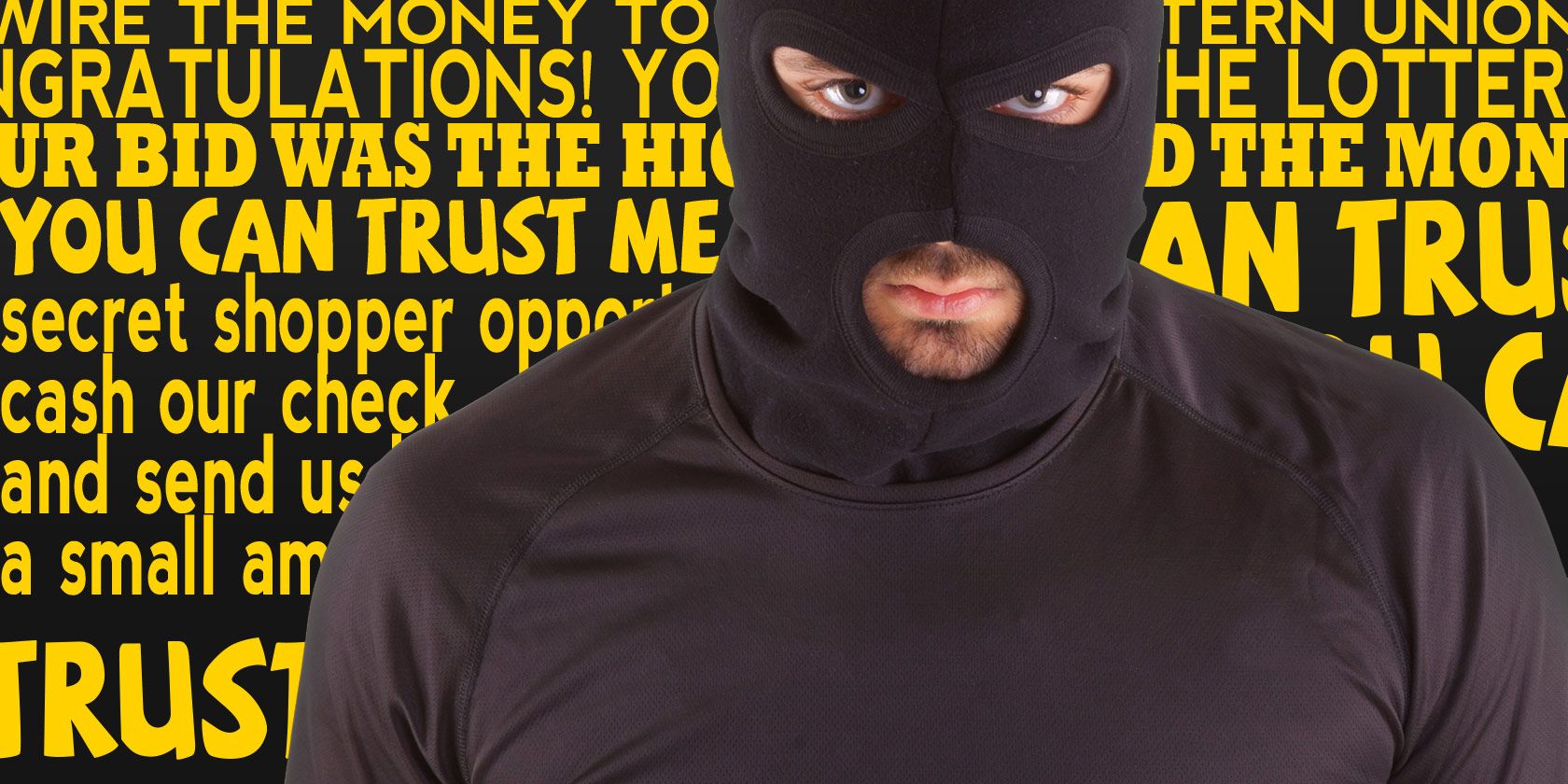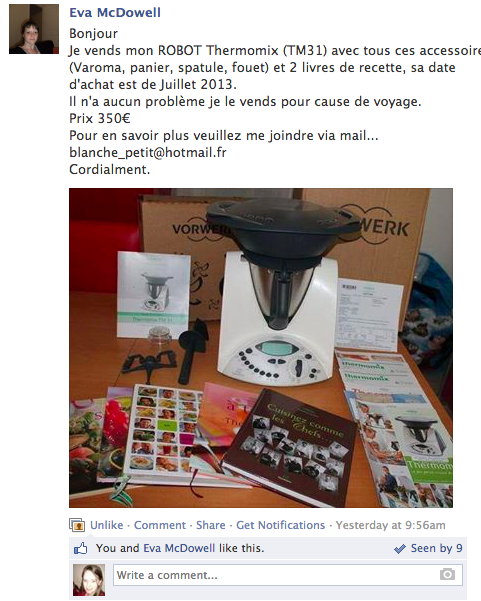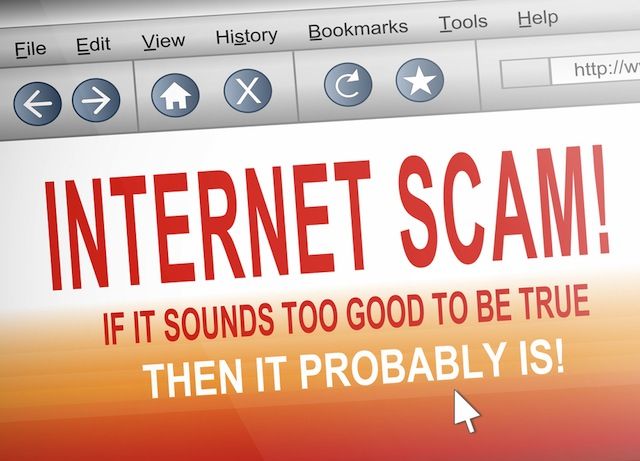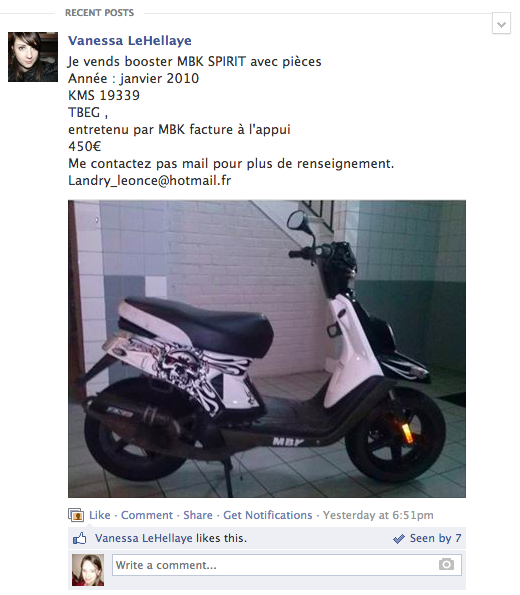Here's a little story about the latest "Nigerian scam," which is all too obvious in hindsight and yet so believable when you're on the hook.
Now, I'm a regular online shopper on Amazon, eBay, and the like. I know the sorts of scams you see on Craigslist and the very similar eBay scams you're likely to come across. I know basic rules of not getting fleeced in marketplace transactions and most of the likely online scams. Yet, still, this one almost got me.
The Scam
It all started on Facebook. A woman posted to a local buy-sell group with a Thermomix for 350€. Now, that's a bloody good deal as those things usually go for 900€. I've been eyeing them for a while, so I know. This is a fantastic price. I check the woman's profile out and she looks legit: she has a long-standing profile, some public photos and is a part of some other groups in the local area. Fair enough.
Her message says to contact an email address, which is doubly odd because the email address doesn't match her name, but whatever. She tells me she bought the item a few months ago, but now has to travel for work. She can't use it because she's away, and she'd prefer the cash. She has left the Thermomix with her brother-in-law who can bring it around whenever I'm free. Sounds reasonable, right?
So, I'm still thinking this is okay. I ask about the payment. People round here like cheques, but if I were selling, I'd prefer to be paid in cash. So, I ask. She says she'd prefer a Western Union transfer, which I can do via the post office or online. I mention that I'd rather not send money before I see the item and that if I can send a payment online I can do that while her brother-in-law is here watching me. That or pay him in cash and he can wire it to the seller. This is far more sensible.
But no, she tells me Western Union has this password protection set up. I nominate a password and when I've seen the goods I tell her brother in law what it is (or email her with it). To me, that sounded like a decent escrow system. I even chatted to my husband about it and we agreed that Western Union sounded like they had a good system in place. I very nearly went ahead with this, until I had a moment to stop and think about it.
So, if I wire this money to a person I don't know with only a password between them receiving the money or not, what is to stop them bribing or whining their way to getting the clerk to hand it over? Not much, really.
The Problem Is With Western Union
Let me get this straight. Western Union realise this is a problem. They have posts about consumer protection and how you should never send money to someone who you don't know in real life. But despite all these warnings for consumers, they haven't actually prevented this from reoccurring. If Western Union didn't have a password system in place, it wouldn't trick otherwise savvy people from thinking this was a legitimate escrow system that they could trust. If they can't trust their agents worldwide to implement the password system effectively, it should be abolished. If there was no password system, I wouldn't have even been tempted by this scam.
Also, Western Union should give warnings to users as they make the transaction. For instance, if they are transferring to a country that is not their own, this would be a good time to remind the customer that this password system is ineffective and that they shouldn't transfer to someone that they don't know.
The Red Flags
The problem with scammers is that they have perfected the art of sounding harmless. All of the red flags were released drip-by-drip so that they didn't look altogether dodgy at a glance.
The first red flag should have been the price. Secondly, the email address not matching. Subsequently, the offer to deliver to my house, then the elaborate payment system and the brother-in-law. Why couldn't I just pay when he arrived? And why is this person ringing from a private number?
When she sent the email with the payment details I realised she wanted me to send the payment to Benin. Where's Benin? Oh, right next door to Nigeria. Another red flag. And the name didn't match hers. Giant. Red. Flag. And why did the details look like a cut-and-paste job? Red Flag!
The final red flag was when the supposed brother-in-law started asking for the transaction number of the payment before he arrived. To begin with, that sort of made sense. But when I thought about it, once he had that transaction code, the only thing stopping them from having my money was a clerk I don't know in a country I don't know, who may or may not bother asking for a password. That's not very secure. Not at all. And with that in mind, they may not even need the code. I'm sure a friendly clerk could look the transaction up for them.
It's A Scam!
It dawned on me that I didn't have any of their details, other than a Facebook profile and an email address. I had no real-life address or phone number for the police to check up on easily. This is scam-a-licious!
Hey, let's stop and do a search for "Western Union Scam Benin". Oh look, there are dozens of similar scam stories, with people specifically mentioning "Coutenou", which is a city I was given in the payment details. Actually, come to think of it, this whole thing sounds dodgy. I might just wait to see if this guy turns up with a Thermomix for me and pay him in cash if he does. He didn't.
I say again, the only reason this looked half-believable is because all of the red flags came at different times. And when looking at this from the perspective of a regular sale of goods locally, these things didn't seem that odd. When your brain thinks you are transferring money to someone local, you almost forget about that tiny change of country (she said she was travelling), and that the country you are sending to might not hold clerks to the same standards of trust as they do nearby.
Lessons Learned
So, the crisis was averted. I am still the owner of my 350€ and I've gained a scary tale to tell. But what I will re-iterate is this: Don't send large amounts of money via the Internet to people you don't know, even if there's a supposed password system in place. Also, just because a Facebook account looks legitimate is no reason to believe it's not a scam. The real Facebook user may have been hacked, or the scammers might just be really good. The Facebook element makes it all the more dangerous, as nowadays we are likely to believe the identities behind these profiles are who they say they are.
And Western Union should definitely get rid of that password feature if it cannot be enforced. It is the trick that brings life to scams like this one.
Have you ever been scammed on Facebook or elsewhere? Did you fall for it or realise just in time?
Image Credit: Man in a mask Via Shutterstock, Internet Scam via Shutterstock




